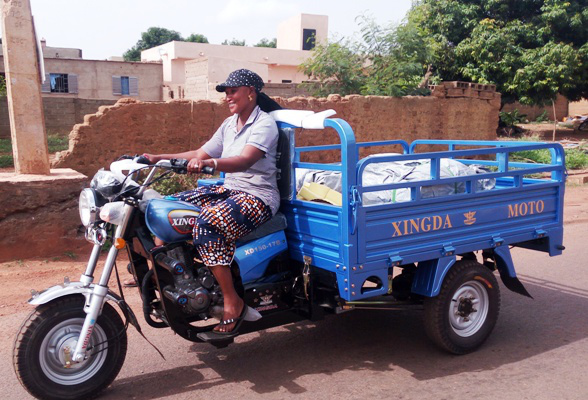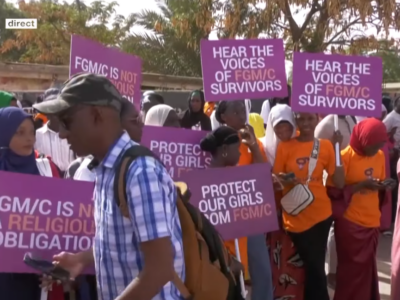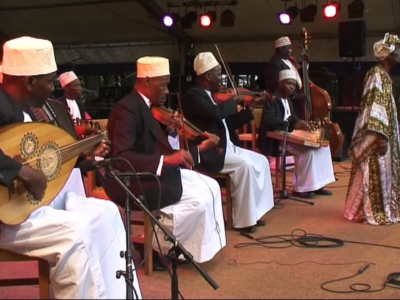Después de varios años marcados por los enfrentamientos en el norte del país, Mali está trabajando de manera progresiva hacía su reconstrucción y reunificación. La tarea es difícil, pero los ciudadanos de Mali no se oponen. Fatoumata Diaby es un ejemplo edificante de esta Mali que no desperdicia nada y se esfuerza a diario para reconstruir la economía. Fatoumata vive en Sakolabada, en el centro de Mali. Global Voices se reunió con ella mientras conducía su mototaxi.
Los mototaxis, llamados comunmente «taxinin» o «katakatanin», se usan hoy en día en casi todas las regiones de Mali. Sirven para el transporte público en algunas ciudades como Ségou, lugar en el que intentan reemplazar los taxis para ofrecer una alternativa más asequible a la gente que vive en la ciudad. En Bamako los utilizan para transportar equipaje. Anteriormente era una actividad que la realizaban exclusivamente los hombres, por lo que Fatoumata es la primera mujer en coger el timón de un «taxinin».
Aquí está la entrevista que Boukary Konaté le hizo a Fatoumata para Global Voices.
GV: ¿Puede presentarse a nuestros lectores?
Fatoumata Diaby (FB): My name is Fatoumata Diaby, I am 35 years old. I am originally from Kéniéba, but I live with my husband in Sakolabada, a gold panning village about 26 km from Kéniéba. We have three children: two boys and a girl. I am a nurse, but I haven't had the chance to practice this occupation.
Fatoumata Diaby (FB): Mi nombre es Fatoumata Diaby y tengo 35 años. Nací en Kenieba, pero vivo con mi marido en Sakolabada, un pueblo en el que se realiza lavado de oro y que se encuentra a 26 km de Kéniéba. Tenemos tres niños: dos chicos y una chica. Soy enfermera, pero no he tenido la oportunidad de ejercer mi profesión.
GV: Ayer te vi en Kati en un mototaxi y te dirigías a Kéniéba. Me contaste que ibas a comprar más mototaxis en Bamako para venderlos en Kéniéba. Conduces este tipo de taxi desde Bamako a Kéniéba. Explícanos el por qué y durante cuánto tiempo llevas haciendo este trabajo.
FD: Sometimes, things happen themselves. I am a trained nurse, but God has not given me the chance to practice this occupation. Instead of crossing my arms, I opened a restaurant in 2011 in Sakolabada. But I couldn't make do for my family with only this job. I bought a motorbike taxi, I learned to drive it, and I started to transport baggage in the gold panning areas. Those who do gold panning need to transport their stones to the mill to extract the gold. I took care of transporting these stones to the mill. I also transported their materials between the city of Kéniéba and the gold panning areas, in their workplaces. Likewise, I also transported water to sell to clients when there was a shortage of water in those places.
In 2015, I was able to open a store to sell replacement parts for motorbikes in the village of Sakolabada. I then stopped with transportation to focus on this replacement parts store. As the clients know that I am familiar with motorbike taxis, they come order from me every time they need parts. Then I go buy the orders in Bamako and I drive them to Kéniéba or to Sakolabada. Even if there are no orders, sometimes, I go buy a motorbike to park it at the store for the clients. That is how I started in the motorbike taxi business.
FD: A veces las cosas ocurren por sí solas. Soy una enfermera cualificada, pero Dios no me ha dado la oportunidad de ejercer mi profesión. En lugar de quedarme cruzada de brazos, abrí un restaurante en el año 2011 en Sakolabada, pero no podía sacar a mi familia adelante con este trabajo únicamente. Compré un mototaxi, aprendí a conducirlo y empecé a transportar equipaje en las zonas de lavado de oro. Aquellas personas que realizan el lavado de oro necesitan transportar sus piedras al molino para extraer el oro. Me encargué de transportar estas piedras al molino. También transportaba los materiales entre la ciudad de Kéniéba y las zonas de lavado de oro, en sus lugares de trabajo. Asimismo, también transportaba agua para venderle a los clientes cuando había escasez en esos lugares.
En 2015 pude abrir un almacén para vender los repuestos para las motos en el pueblo de Sakolabada. Fue entonces cuando dejé de transportar para centrarme en el almacén de repuestos. Como los clientes saben que estoy familiarizada con los mototaxis, vienen a hacerme pedidos cada vez que necesitan repuestos. Luego compro los pedidos en Bamako y los llevo a Kéniéba o a Sakolabada. En ocasiones, incluso si no hay pedidos, compro una moto para aparcarla en el almacén para los clientes. Así fue como comencé en el negocio de los mototaxis.
GV: ¿Cuánto cuesta un mototaxi en Bamako y cuál es tu beneficio después de la venta en Sakolabada o Kéniéba?
FD: It depends on the rise and fall of the price on the market. For example, I can buy a motorbike for 1,180,000 FCFA (about $2,000 USD) in Bamako and deliver it to the clients for 1,230,000 FCFA (about $2,100 USD). The fuel to go from Bamako to Kéniéba costs me 25,000 FCFA. What is important in all that is that I transport new replacement parts that I buy for my store in the motorbike. Thus, I don't pay shipping fees to car drivers, not for myself, nor for a motorbike taxi, nor for replacement parts. I don't get all the profit directly from the sale of the motorbike taxi, but also from the fact that I don't pay all these shipping fees, which constitutes for me a profit in itself if one knows that, by car, transportation fees for a person from Bamako to Kéniéba are 6,000 to 7,000 FCFA, 50,000 FCFA for a motorbike taxi, and between 30,000 and 35,000 FCFA for the replacement parts that I buy for the store.
FD: Depende de la subida y bajada del precio en el mercado. Por ejemplo, puedo comprar una moto por 1.180.000 FCFA (alrededor de $2.000 USD) en Bamako y entregárselo a los clientes por 1.230.000 FCFA (alrededor de $2.100 USD). El combustible para ir de Bamako a Kéniéba me cuesta 25.000 FCFA. Lo que importa de todo eso es que transporto en la moto nuevas piezas de recambio que compro para mi almacén. De este modo, no pago gastos de envío a los taxistas, ni por mi, ni por el mototaxi ni por los repuestos. El beneficio no lo obtengo en su totalidad directamente de la venta del mototaxi, sino también del hecho de no pagar todos estos gastos de envío que constituyen para mí un beneficio por sí mismo, si uno sabe que los gastos de transporte para una persona de Bamako a Kéniéba en coche son de 6.000 a 7.000 FCFA, 50.000 FCFA para un mototaxi, y entre 30.000 y 35.000 FCFA para los repuestos que compro para el almacén.
GV: Fatoumata, hacerse cargo de una familia y encargarse de este trabajo no es algo fácil de hacer…
FD: I have never encountered insurmountable difficulties. I do this work with the consent of my husband and he supports me very much. Sometimes, we work together. Him, he works in the mines, but when I go to Bamako for purchases, he runs the store. For domestic work, my husband and I manage together in a way that each of us has time to prosper in our work. I have also hired a girl that I pay each month. She helps in domestic work and we get along very well with her. So the three of us lead a respectable life of commerce and domestic work.
FD: Nunca me he encontrado ante dificultades insuperables. Realizo este trabajo con el consentimiento de mi marido y él me apoya mucho. En ocasiones trabajamos juntos. Él trabaja en las minas, pero cuando voy a Bamako a comprar, se encarga del almacén. En cuanto al trabajo doméstico, mi marido y yo nos encargamos de manera que cada uno de nosotros tiene tiempo para avanzar en su trabajo. También he contratado a una muchacha a la que pago mensualmente. Ayuda en el trabajo doméstico y nos llevamos muy bien con ella. Así que los tres llevamos una vida respetable de comercio y trabajo doméstico.
GV: ¿Qué ocurre con los otros propietarios de mototaxi en Kéniéba?
FD: I get along well with the other owners. Everyone has their chance every day. The only difference is that the motorbikes that I drive from Bamako to Kéniéba are well run and arrive in good condition. The clients prefer these motorbikes to those transported in trucks which sometimes are deformed on arrival because of the loads that they put in the trucks.
FD: Me llevo bien con los demás propietarios. Todo el mundo tiene cada día su oportunidad. La única diferencia es que las motos que yo conduzco desde Bamako a Kéniéba funcionan de maravilla y llegan en buenas condiciones. Los clientes prefieren estas motos a las que son transportadas en camiones, ya que a veces llegan defectuosas debido a la cantidad que llevan en los camiones.
GV: ¿Cuánto aprecia la gente lo que haces?
FD: People like what I do very much. Everyone encourages me in this work. I do my best to thank the populations of Sakolabada and Kéniéba for their encouragement. The men and women support me a lot, even if certain women think that what I do is not acceptable work for a woman, and incidentally it is for this reason that I have been nicknamed ‘Katakataninbolila Fatim’ (Fatim, the driver of Katakanin, as people like to call motorbike taxis in bambara).
FD: A la gente le gusta mucho lo que hago. Todo el mundo me anima con este trabajo. Hago lo mejor que puedo para agradecer a la gente de Sakolabada y Kéniéba su ánimo. Los hombres y mujeres me apoyan mucho, aunque algunas mujeres piensan que lo que hago no es un trabajo aceptable para una mujer y por este motivo me han apodado «Katakataninbolila Fatim» (Fatim, la conductora de Katakanin, que es como a la gente le gusta llamar a los mototaxis en bambara).
GV: ¿Tienes algún problema el apodo?
FD: Not at all! It is a pleasure for me to be named that! It shows my work, it means that I am known in my work, that I like it and I do it well. And also, it is not said that everyone necessarily must share my thoughts, my ambitions.
FD: ¡Para nada! Para mí es un placer que me llamen así, ya que muestra mi trabajo y significa que me conocen por mi trabajo, el cual me gusta y hago bien. Y también, y esto no quiere decir que todo el mundo deba compartir mis pensamientos necesariamente, mis ambiciones.
GV: Respecto a este trabajo, ¿qué recuerdo puedes compartir con nosotros?
FD: One day, my sister noticed that I was late and called me on the phone to ask what I was doing. I parked in order to pick up the phone and told her that I was about to arrive and that I was on a motorbike (this was my first time at the wheel of a motorbike). Stunned, she told the women and children of the village. Then they all got together to come greet me at the entrance to the village on foot, on motorbikes, and in cars with tam-tams. That was a huge surprise for me. I am still grateful to the entire population of Kéniéba for this gesture of recognition which was a great honor and source of joy for me.
FD: Un día mi hermana se dio cuenta de que llegaba tarde y me llamó al teléfono para preguntarme qué estaba haciendo. Aparqué para coger el teléfono y le dije que estaba a punto de llegar en moto (era la primera vez que estaba sobre las ruedas de una moto). Asombrada, se lo contó a las mujeres y niños del pueblo. Todos juntos se dirigieron a pie, en motos y en coches con tam-tams a la entrada del pueblo para recibirme. Eso fue una gran sorpresa para mí. Todavía estoy agradecida a toda la población de Kéniéba por este gesto de reconocimiento, que fue un gran honor y un motivo de alegría para mí.
GV: Vivimos en una sociedad en la que la tradición dice que algunas tareas están reservadas para los hombres. ¿Reivindicas en tu trabajo ser una mujer que realiza un trabajo reservado para los hombres?
FD: My goal is not to compare myself to men in doing this work at all. I do it out of passion, I do it because I love it, I do this work because it is how I make my living. In doing it, I promote a message and this message is none other than to show to women and young people that it is no longer the time to sit down, nobody has to cross their arms, that we no longer have to choose between occupations with the idea that one has a diploma and must therefore work in an office. It is this message that I promote and I see myself as an example of this message I send to everyone. As for the idea of equality between men and women, I have not mastered all the subtleties, but for me what counts, especially in the home between the wife and her husband, is comprehension, understanding, and complementing qualities. When a man and his wife get along well, all is happiness in the home, and it is that equality that we look for.
FD: Mi objetivo no es compararme con los hombres que hacen este trabajo. Lo hago por pasión, lo hago porque me gusta, hago este trabajo porque es la manera en la que me siento viva. Llevándolo a cabo promuevo un mensaje y este mensaje no es otro que mostrar a las mujeres y a los jóvenes que no es tiempo de sentarse, que nadie tiene que estar cruzado de brazos, que ya no tenemos que elegir entre las profesiones con la idea de que uno tiene un diploma y debe por tanto trabajar en una oficina. Este es el mensaje que promuevo y me veo a mí misma como ejemplo del mensaje que le envío a todo el mundo. En cuanto a la idea de igualdad entre hombres y mujeres, no he vencido todas las sutilezas, pero para mí lo que cuenta, especialmente en el hogar entre la esposa y su marido, es la comprensión, el entendimiento, y complementar cualidades. Cuando un hombre y su esposa se llevan bien, todo en el hogar es felicidad y esa es la igualdad que buscamos.
GV: ¿Con qué dificultades te has encontrado desde que empezaste a transportar taxis de moto desde Bamako a Kayes?
FD: In this occupation, I can't speak of major difficulties, but it is tiring to drive a motorbike taxi from Bamako to Kéniéba (400km). Sometimes, the motorbike also breaks down. When these types of things happen along the way, I repair the motorbike myself: I can patch the tire or change the brakes. I have all the materials for these types of repairs with me.
FD: En esta profesión no puedo hablar de grandes dificultades, pero es agotador conducir un taxi de moto desde Bamako a Kéniéba (400 km). La moto a veces se estropea. Cuando este tipo de cosas suceden en el camino, yo misma arreglo la moto: puedo reparar el neumático o cambiar los frenos. Tengo todos los materiales para este tipo de reparaciones.
GV: ¿Unas últimas palabras?
FD: I thank you for this interview. In this unique line of work, I don't see myself as a hero, but as an example. I see myself as a source of inspiration for women and young people. They will understand I hope, through what I do, that the time to consider oneself superior or inferior regarding a job is over. It is okay just to love what you do and fight for it because success comes as a result of effort.
FD: Te agradezco esta entrevista. En esta exclusiva línea de trabajo, no me veo como una héroe, sino como un ejemplo. Me veo como una fuente de inspiración para mujeres y jóvenes. Entenderán, espero, por lo que hago, que se ha terminado la época de considerarse uno a sí mismo superior o inferior dependiendo del trabajo que realiza. Basta con solo amar lo que haces y luchar por ello porque el éxito sucede como resultado del esfuerzo.








1 comentario